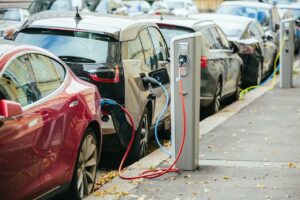Ghana will be one of the first in Africa to succeed with electric mobility
 Madam Doris Duodu, Deputy Director for Renewable Energy at the Ministry of Energy, says Ghana is well positioned to lead the charge for the transition into an electric mobility regime in Africa.
Madam Doris Duodu, Deputy Director for Renewable Energy at the Ministry of Energy, says Ghana is well positioned to lead the charge for the transition into an electric mobility regime in Africa.
She said the nation’s wealth of electrical energy would play to its advantage in the promotion and success of an electric vehicle.
Speaking at the first Regional Consultative meeting on the draft Electric Vehicle Policy in Ho, Ms. Duodu said the coming EV regime would help provide demand for the huge chunk of excess electrical power generated and thus a Drive Electric Initiative by the Energy Commission and its stakeholders to promote patronage.
“Our current installed capacity of over 5,400 megawatts is significantly more than our current peak demand of about 3,700 megawatts. At this current rate, Ghana will need to create demand within the system to take the excess supply of electricity.
“Ghana will be one of the first to set an example that West Africa and for that matter Africa can be part of the success story of electric mobility,” she said while touting the benefits of the “Drive Electric Initiative” campaign.
The Deputy Director said the campaign, which stood upon the nation’s renewable energy resources including solar, would help save the country from the inundation of internal combustion engines, which are being phased out, and would secure an of green and sustainable technology for the future.
“With our ambitious target of achieving our renewable energy commitment under the Paris agreement, Ghana will not only be spearheading the drive for electric vehicles but leading Africa into a clean and sustainable energy production and utilisation.”
Ms. Duodu said the world faced a timeline of less than a decade to avert “catastrophic climate change” according to the Intergovernmental Panel on Climate Change, and that, “it is not so much a lifestyle choice but a necessity for survival for everyone to switch to electric vehicles in the next few years to contribute to the reduction of global warming”.
She said the adoption of EVs had increased as major auto manufacturers and markets moved to address carbon emissions, with some countries such as China, France, and the UK considering a radical ban on the production and sale of internal combustion engines (ICEs).
“It is time for Ghana and Africa to follow suit and make plans towards embracing electric vehicles ourselves in order to harness our enormous solar energy potential productively to meet our climate emission targets while simultaneously providing clean and affordable means of transport,” the Deputy Director added.
She said the “enormous savings” on using an EV owing to its low energy cost, had become a pull factor, and that a baseline study by the Energy Commission made bare the prospects and the outlooks for the country.
The study said Ghana currently had four level 2 charging stations all concentrated in Accra, and that the skills base for the emerging technology were in “short supply” with only three adequately resourced EV dealerships and maintenance outlets available.
The study also reported a “huge gap” in public awareness on the prospects of EVs, and which was evident in the reactions of Ghanaians to the possibility of owning the vehicles built on the platform.
The report said about 17,000 plug-in EVs were imported into the country from 2017 to 2021, while the Ghana Revenue Authority observed a 91 per cent representation of hybrid electric vehicles among the EV category 2021.
Mr. Frederick Obeng Adom, Deputy Minister for Transport, who opened the meeting, said the nation’s transport sector continued to own a significant share of greenhouse gas emissions, with 99 per cent of the about 3.2 million registered vehicles being powered by petrol and diesel burning ICEs.
He said it was crucial that Ghana took advantage of opportunities in new energy regimes towards a net-zero emission future, which was being made possible through the development of the National Electric Vehicle Policy which evolved from an Electric Mobility Framework developed in 2022.
The Deputy Minister said extensive stakeholder consultation was needed in producing the best national policy, and which would cater for the interests of all including the various Ministries, Agencies and Departments, and also focal groups such as vehicle manufacturers, transport operators, repair and maintenance outlets and civil society organisations.
He gave the assurance that the Government would not hasten the transition, and that the cost buildup at the ports over vehicle importations was one of strategies to limit the influx of older vehicles for environmental safety.
“It is actually going to be very gradual as we build into the system of electric vehicles,” Mr. Adom stated, and assured also that stranded human resources within the transition would be taken care of.
There were presentations on the draft National Electric Vehicle Policy, which offered the wide representation at the meeting the opportunity to seek clarifications and provide input and suggestions to its improvement.
The policy document, built upon international best practices, is expected to transform transport in the country, and would be forwarded to Cabinet for approval after completing nationwide consultations.
Source: GNA
